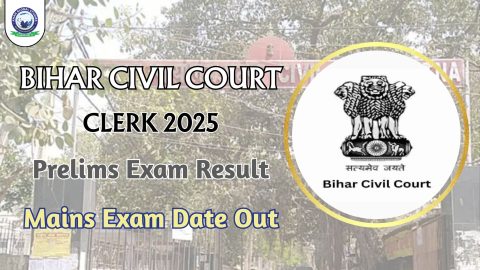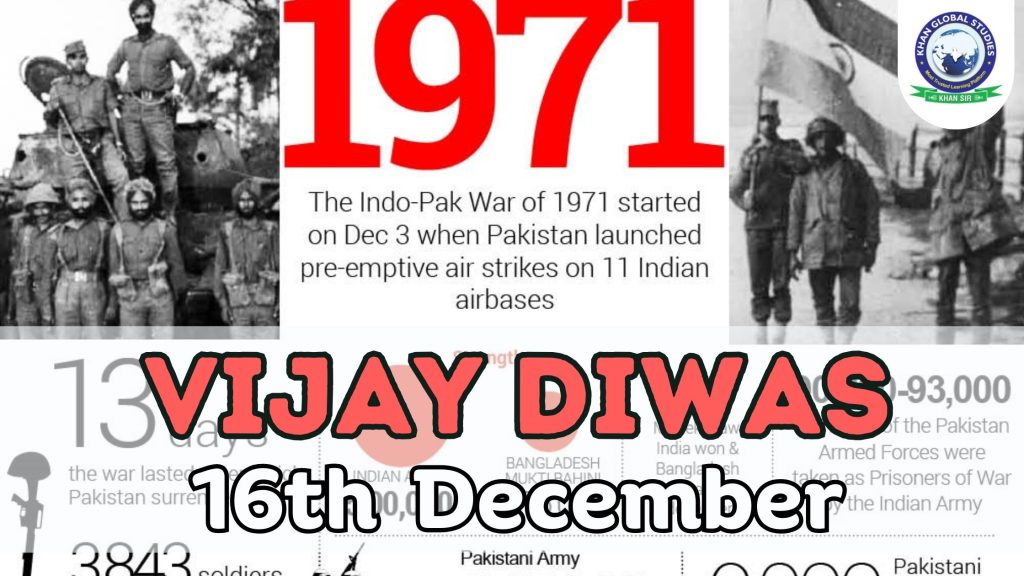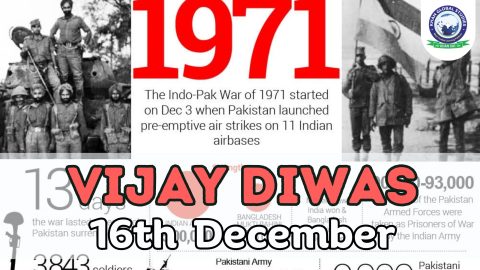Every year on December 16, India celebrates Vijay Diwas to commemorate its historic victory in the 1971 Indo-Pak war. On this day, the Pakistani army surrendered to the combined forces of the Indian Army and the Bangladesh Liberation Army, marking the birth of Bangladesh as an independent nation. Vijay Diwas symbolizes the liberation of Bangladesh and the end of oppressive Pakistani rule. In India, the day honors the sacrifices of soldiers and highlights the historical significance of the 1971 war.
History of Vijay Diwas
The history of Vijay Diwas is deeply connected to the 1971 Indo-Pak war, which was triggered by the atrocities and human rights violations committed against the people of East Pakistan (now Bangladesh).
In the 1970 general elections, Sheikh Mujibur Rahman’s party, the Awami League, won a clear majority in East Pakistan. However, Pakistan’s military government refused to transfer power, escalating dissatisfaction in East Pakistan and fueling the independence movement.
In 1971, East Pakistan began an armed struggle for independence, known as the Bangladesh Liberation War. This conflict was rooted in the long-standing political, linguistic, and economic disparities between East and West Pakistan.
- Linguistic Division: Most people in East Pakistan spoke Bengali, while Urdu was preferred in West Pakistan. The decision in 1948 to make Urdu the official language sparked widespread protests in East Pakistan.
- Economic Inequality: Although East Pakistan significantly contributed to the nation’s economic growth, the benefits were disproportionately enjoyed by West Pakistan. This imbalance was a major source of resentment.
- Political Crisis: After Sheikh Mujibur Rahman’s Awami League secured a majority in the 1970 elections, the West Pakistani government refused to hand over power, leading to political unrest and calls for independence.
- Repressive Actions: The Pakistani military launched “Operation Searchlight” in March 1971, targeting East Pakistan’s population. This operation led to the massacre of millions and widespread atrocities.
These events culminated in the Bangladesh Liberation War, during which India supported East Pakistan’s independence movement, leading to the decisive victory celebrated as Vijay Diwas.
India’s Role
When violence and massacres escalated in East Pakistan, millions of refugees fled to India. This humanitarian crisis and the resulting regional instability prompted India to support East Pakistan’s independence movement.
In March 1971, the Pakistani military launched “Operation Searchlight,” leading to widespread atrocities in East Pakistan. This caused an influx of refugees into Indian states like West Bengal, Tripura, Assam, and Meghalaya, creating a massive humanitarian crisis. The then Prime Minister of India, Indira Gandhi, raised the issue on international platforms, seeking global intervention.
Due to the slow response from the international community and worsening conditions, India decided to extend strategic and military support to the independence movement in East Pakistan. India provided critical assistance to the Mukti Bahini, the Bangladeshi liberation forces, in terms of training, resources, and military planning.
On December 3, 1971, Pakistan launched an attack on Indian air bases, prompting India to respond with full-scale military action. The Indian Army, Navy, and Air Force coordinated a 13-day campaign, resulting in a decisive victory.
Pakistan’s Surrender
On December 16, 1971, Pakistan’s military formally surrendered to the joint forces of the Indian Army and the Mukti Bahini in Dhaka. Approximately 93,000 Pakistani soldiers laid down their arms, making it one of the largest surrenders in modern military history. This victory led to the creation of Bangladesh as an independent nation and marked a monumental moment in South Asian history.
Operation Vijay and Surrender
- Operation Vijay: This was the Indian Armed Forces’ military campaign aimed at liberating East Pakistan and protecting its people from the atrocities committed by the Pakistani military.
- Support to Mukti Bahini: India provided training and resources to the Mukti Bahini (Bangladesh Liberation Forces), enabling them to fight effectively.
- Strategic Military Planning: The Indian Army executed coordinated operations across land, air, and sea with precision.
- Surrender: On December 16, 1971, over 93,000 Pakistani soldiers surrendered in Dhaka, marking the largest military surrender since World War II.
Key Military Operations
- Battle of Longewala: At the Longewala post in Rajasthan, 120 Indian soldiers held off an attack by 2,000 Pakistani troops and their tanks. On December 5, 1971, the Indian Air Force inflicted significant losses on the advancing Pakistani forces.
- Operation Trident: On the night of December 4-5, 1971, the Indian Navy launched an attack on Karachi port, dealing a major blow to Pakistan’s naval forces.
- Operation Python: Following Operation Trident, the Indian Navy targeted the remaining ships in Karachi harbor, causing further destruction.
Significance of Vijay Diwas
- A Glorious Chapter in India’s Military History: Vijay Diwas reflects the strength, resilience, and strategic brilliance of the Indian Armed Forces.
- Bangladesh’s Independence: This day celebrates the freedom of Bangladesh and the triumph of human rights and justice.
- Formation of Bangladesh: On December 16, 1971, Bangladesh emerged as an independent nation. It is celebrated as “Vijay Diwas” or “Bijoy Dibosh” in Bangladesh, symbolizing their struggle for liberation and identity.
- National Unity and Pride:Vijay Diwas honors the brave soldiers who sacrificed their lives in the war and serves as a reminder of India’s commitment to justice and freedom.
How Vijay Diwas is Celebrated
- National Ceremonies: In India, homage is paid at Amar Jawan Jyoti at India Gate in New Delhi. The Defense Minister, along with the Chiefs of the Army, Air Force, and Navy, participate in the ceremonies.
- Commemorations and Parades: Military parades, cultural programs, and exhibitions are organized to honor the contributions of the armed forces.
- Celebrations in Bangladesh: In Bangladesh, this day is celebrated as “Vijay Diwas” (Bijoy Dibosh) with great enthusiasm, marking their independence and victory.
Significance of Victory for India
- Diplomatic Success: India’s decisive role in resolving a humanitarian crisis earned it widespread global recognition.
- Geopolitical Stability: The formation of Bangladesh brought stability to South Asia by addressing the political and social unrest in the region.
- Strategic Triumph: The war showcased India’s military coordination and strategic acumen, solidifying its position as a regional power.
Interesting Facts About Vijay Diwas
- Shortest and Most Effective War: The 1971 war lasted only 13 days, making it one of the shortest and most decisive wars in history.
- Unprecedented Cooperation: India’s Army, Navy, and Air Force worked in perfect coordination to achieve a swift victory.
- Sacrifices of Indian Soldiers: Over 3,900 Indian soldiers were martyred, and more than 10,000 were injured during the conflict.
Essence of Vijay Diwas
Vijay Diwas symbolizes the valor and dedication of the Indian Armed Forces and celebrates the ideals of freedom, human rights, and justice. It reminds us that courage, unity, and the pursuit of justice always triumph.
This day stands as a tribute to the bravery of Indian soldiers and the indomitable spirit of the people of Bangladesh. Vijay Diwas inspires us to remember the sacrifices, courage, and diplomacy that shaped this historic victory, serving as a beacon of hope and determination for future generations.
FAQs
Q1: When is Vijay Diwas celebrated?
Answer: Vijay Diwas is celebrated every year on December 16.
Q2: Why is Vijay Diwas celebrated?
Answer: Vijay Diwas commemorates India’s victory in the 1971 Indo-Pak war and the liberation of Bangladesh.
Q3: How long did the 1971 war last?
Answer: The war lasted for 13 days, from December 3 to December 16, 1971.
Q4: Who was involved in the 1971 war?
Answer: The war was fought between India and Pakistan. India supported the Mukti Bahini, the Bangladesh liberation forces, in their fight for independence.
Q5: How is Vijay Diwas celebrated?
Answer: Vijay Diwas is marked by tributes to martyrs, military parades, and various cultural and patriotic events organized across India.
R




